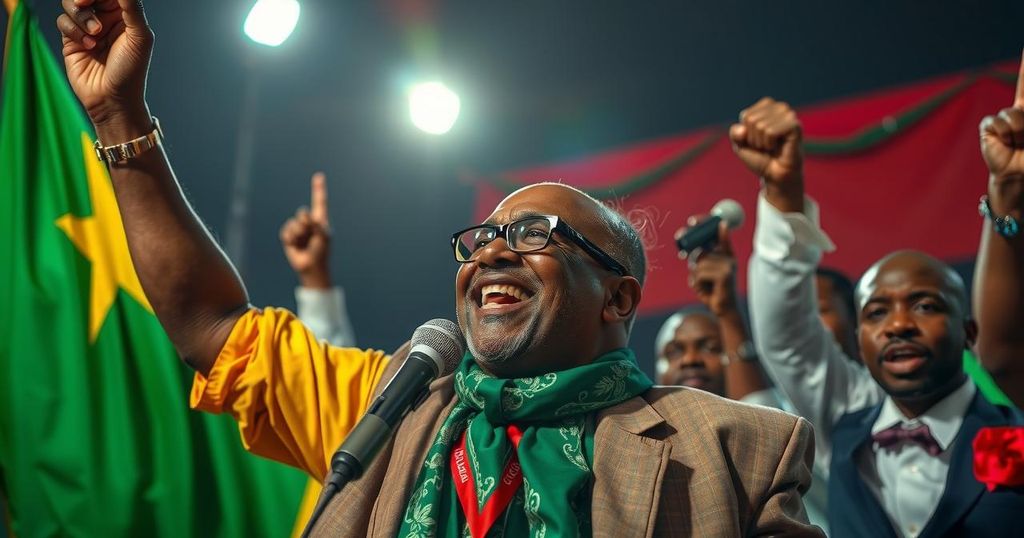Somaliland Opposition Leader Wins Presidential Election

Somaliland’s opposition leader, Abdirahman Mohamed Abdullahi, won over 50% of the votes in the recent presidential election, marking a significant political shift. Abdullahi’s party, Waddani, campaigned on democratic reforms and economic revival, while incumbent President Muse Bihi Abdi garnered over 30% in his bid for a second term. Despite the election being delayed twice, its successful conduct raises hopes for improved relations between Somaliland and Somalia, as well as regional stability.
In a significant political shift, Somaliland’s opposition leader, Abdirahman Mohamed Abdullahi, has clinched victory in the recent presidential elections, as announced by the electoral commission. Representing the Waddani Party, Abdullahi secured over 50% of the votes, marking a pivotal moment in the region’s governance. At 69, he previously held the position of parliament speaker in 2005 and now emphasizes democratic reforms and economic revitalization, alongside addressing youth unemployment as primary objectives during his tenure. In contrast, the incumbent, President Muse Bihi Abdi, who led the ruling Kulmiye Party and sought re-election after a seven-year term, garnered slightly over 30% of votes. His presidency had been marked by efforts to gain international recognition for Somaliland, a region that declared independence amid turmoil from Somalia in 1991. Despite the lack of global acknowledgment, Somaliland has managed to develop independent governance, currency, and security systems, setting it apart from the ongoing challenges faced by Somalia. The conduct of this election was notably disrupted, having been postponed twice since 2022 owing to financial deficiencies and other complications, yet it ultimately proceeded successfully. The Waddani Party’s campaign focused on invoking democratic values as well as fostering social unity, while also proposing to leverage Somaliland’s recent agreements with Ethiopia, which involve access to the Indian Ocean in exchange for potential international recognition. However, this agreement has sparked controversy, with concerns raised regarding the lack of concrete benefits for the region. Scholars, such as Mohamed Husein Gaas from the Raad Peace Research Institute, criticized the hurried and secretive nature of the pact. The outcome of the election has been met with optimism by various political figures in Somalia, who anticipate strengthened relations between Somaliland and the Somali federal government. Former Somali Prime Minister Hassan Ali Khaire expressed hope that the new administration under Abdullahi would foster peace and unity among the Somali populace. Additionally, Ismail Omar Guelleh, the President of Djibouti, extended his congratulations to Somaliland’s president-elect, underscoring regional support for the election results.
Somaliland declared independence from Somalia in 1991 following a period of conflict, and since then, it has established a stable political framework and governance structure, which is in stark contrast to Somalia’s ongoing security challenges. Although Somaliland has not achieved international recognition, it has managed to build and maintain its own currency, government, and security services. The recent elections were seen as pivotal for Somaliland’s political future and its international relations, particularly concerning its evolving connection with Ethiopia and the implications of recent agreements that affect regional trade and security dynamics.
The electoral victory of Abdirahman Mohamed Abdullahi signals a potential turning point for Somaliland as it seeks to address pressing issues such as economic reform and democratic governance. The Waddani Party’s rise to power represents a significant challenge to the incumbent administration and may foster enhanced relations with Somalia, alongside regional allies like Ethiopia. Leaders from within Somalia and neighboring countries have expressed hope that this change in leadership could lead to broader stability and collaborative dialogue in the Horn of Africa.
Original Source: www.seattletimes.com








